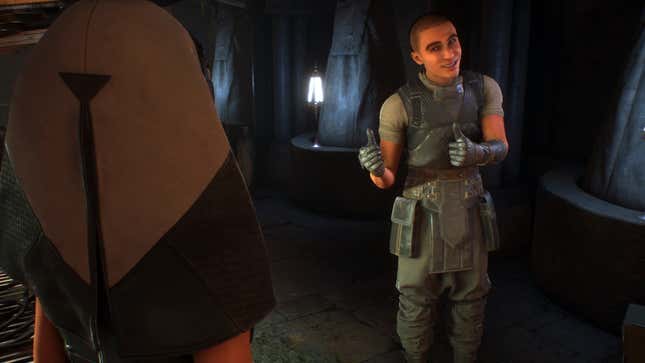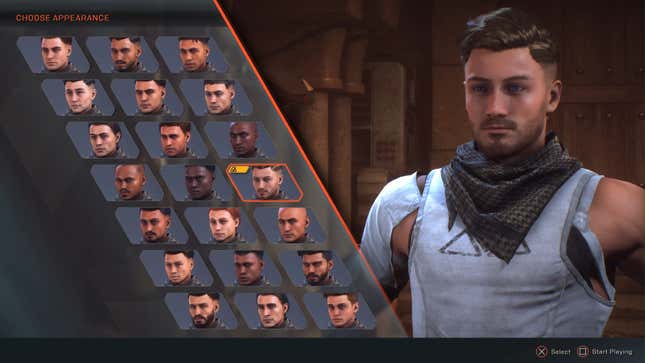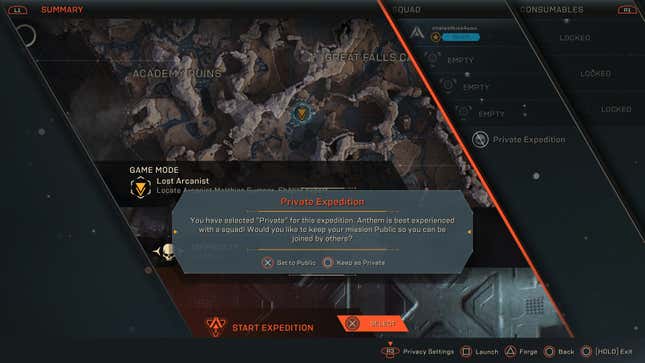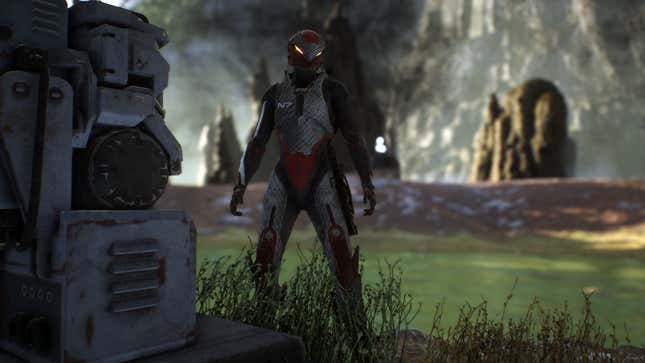
Last week, BioWare announced that Anthem, the studio’s ill-advised loot shooter from 2019, would finally be sunset on January 12, 2026. This wasn’t a surprise for anyone who had been paying attention, but for those who weren’t, it was a shock that the game hadn’t already been shut down years ago. Anthem was a tragedy of errors. The loot shooter was a misuse of the RPG studio’s talents, and from the sound of it, a mess to put together internally. Two years after launch, BioWare announced it was scrapping its planned revamp of the game, and four years after that, the game is going away forever.
Once the servers go offline, no one will be able to play Anthem ever again. Knowing the end is coming, I booted up Anthem again for the first time in six years. I had hoped that with time and distance, I would be able to appreciate the game for what it was. I wasn’t as down on Anthem as others back in the day, and even thought there was potential hidden under the live-service glut. Now, half a decade later, and having seen Electronic Arts desecrate BioWare in the years that followed, I think I resent Anthem as a destructive detour more than I did back then. But even the worst games don’t deserve to be obliterated.
In 2019, I tried to see the good in Anthem. I recognized it for what it was: a trend-chasing game likely demanded from on high by a publisher looking for its next live-service hit. It didn’t matter if it was pulling resources from the types of games BioWare was historically known for or if it was diametrically opposed to what made the studio such a powerhouse in the western RPG landscape. Loot shooters and forever games were the current hotness, and expertise and legacy weren’t as important as the trend of the moment. But in the margins, I saw flashes of BioWare’s best-in-class character writing, and by god, its flying mechanics still feel pretty incredible in 2025. But now that EA and BioWare are shutting the game down, what once felt like a studio trying to make the best of a bad situation just feels like a cynical attempt at fitting a square peg into a round hole.
Anthem is the quintessential “made by committee” video game. It looks like the kind of thing you see a kid playing in the background of a TV show that is just descriptive enough to read as a video game but not distinct enough to have any discernible personality of its own. Everything about it feels like it’s meant to depersonalize you in favor of a spotlighting faceless, ugly suit of armor called a Javelin. You can’t customize your freelancer’s appearance, the character doesn’t even have a name, and the preset faces you choose will show up in-game fewer times than you can count on one hand. Its binary dialogue choices feel specifically written to have no impact, rather than even attempting to emulate the illusion of choice like the rest of BioWare’s catalog.
The only real expression you get is in the colors and designs you slap on your Javelin, and even the sleekest among them are some ugly clunkers that no amount of customization can beautify. You can change up your emotes, but they’re the same handful every other player has. In many of their other releases, against all odds, BioWare has excelled in handing players a higher level of authorship than they usually receive in big-budget games. Anthem, meanwhile, doesn’t just feel like a pivot away from player expression; it feels like it was actively trying to stifle it at any chance it could. In 2019, I had some hope that BioWare would course-correct this in future updates, but now that those aren’t coming, what remains of Anthem feels creatively sterile, both for players and BioWare.

When you’re not flying around in your Javelin, most of Anthem takes place in a vaguely sci-fi fantasy fortress called Fort Tarsis. Here is where some of BioWare’s strengths show, with characters who provide tantalizing glimpses into a world that feels otherwise underdeveloped. Owen, the player’s sprightly assistant who eventually betrays you, could have been a classic BioWare character in a game that afforded its relationships the same depth as its other work. But because Anthem can only gesture at the acclaimed BioWare house style, characters mostly talk at the player, rather than to them. Meeting Anthem’s cast feels voyeuristic, with its first-person perspective and lackluster dialogue options emulating something like Disney’s theme parks that have a character set up in one designated area for you to interact with briefly as you pass through. Ironically enough, that feels appropriate given that a lot of Fort Tarsis feels like an abandoned theme park. Walking through rooms that were once meant to facilitate repeatable quests is haunting, given that there aren’t other players to help you play through them.
As much as playing Anthem feels like looking into a void, flying through its non-descript environments still fucking rules. The flight controls feel incredible. The Javelins you can pick from are each huge, clunky monstrosities, but Anthem manages to make them feel weighty and light on their feet at the same time. Flight in video games is easy to get wrong because it can often either feel too slow to be useful or it can be so floaty that it can be hard to maintain control and precision. Anthem hits the perfect sweet spot. It’s kind of wild that the internet spent so long clowning on BioWare for Anthem’s misguided live-service aspirations and Mass Effect: Andromeda’s animations that we glossed over how the studio had become a real force to be reckoned with on the action combat front. Dragon Age: The Veilguard is rightfully divisive, but it received a lot of praise for its tight, fluid combat. Anthem is a dry as hell game emulating trends it was years late to, but you won’t find a better Iron Man simulator on the market. That’s including the actual Iron Man VR game. Well, that’s actually your only option now, because Anthem isn’t actually on the market anymore. The game has been delisted from every online store, and physical copies are going to stop working in January.

When I played through the early hours of Anthem, I had almost forgotten it was supposed to be a multiplayer game. There were hints, such as the way mission objectives were spread across large areas encouraging teams of players to split up to find them, but I was having a decent enough time handling the game myself that it wasn’t until the haunting “matchmaking” icon showed up when I tried to start a mission, only to get no answer from other players, that I forgot this is why Anthem is going away forever.
In EA’s announcement blog, there’s a Q&A section that says the reason Anthem is shutting down and will be unplayable after January is that the game was “designed to be an online-only title, so once the servers go offline, the game will no longer be playable.” Meanwhile, here I am, holding my own in battles which, yes, were obviously meant to be experienced by multiple players at once, but are still perfectly serviceable to play alone. But putting in the effort under the hood to make Anthem a single-player game someone could still experience after next January would require work that EA and BioWare don’t seem willing to do. No one at the studio has been working on Anthem, and EA even confirms in the post that flipping the switch in January won’t result in any layoffs. So if no one’s working on it at all right now, why would they devote the resources to rebalancing the game for offline play so it isn’t dropped into a black hole?
One of the frequent refrains in Anthem is that freelancers are “strong alone, stronger together.” At the time, this tagline felt like a desperate plea to BioWare fans who had grown accustomed to the team’s solitary RPGs that they weren’t being left behind in this uncharacteristic pivot. Anthem is a game you can play with others, but if you persist, you can play it by yourself, too, right? Well, not anymore.

Shutting down Anthem is probably the right business decision. If I can’t even find players when the game is in its final months, that probably means that not enough people are roaming around Fort Tarsis to justify the cost of keeping the game online. That being said, it also feels like one last deluded assertion that the game couldn’t have been anything other than what it was. It’s an act that asserts Anthem was always intended to be exclusively a multiplayer experience, an assertion that the game itself insists wasn’t the case time and time again. Finishing the scant story content that exists in Anthem, the start of what was meant to be a years-long endeavor, feels like scrambling through a series of unfinished design documents, with vague ideas written in big red letters that it doesn’t feel like BioWare or EA really had thought about much. But even given the slapdash approach here, EA destroying Anthem while also scattering the studio’s foundational talent to the winds marks the latest instance of cultural vandalism this company has committed on BioWare’s history.
Whatever BioWare was planning was killed before it got out the door, and now all we have is a time capsule of corporate hubris, and we won’t even have that for much longer. Anthem had such a blind confidence in “the demands of the market” that it forgot to consider whether following them was worthwhile. Nobody knew where Anthem was going. After years of work, the upheaval of a studio’s storied legacy, and years of horror stories to go with it, it turns out the only place Anthem went was absolutely nowhere.